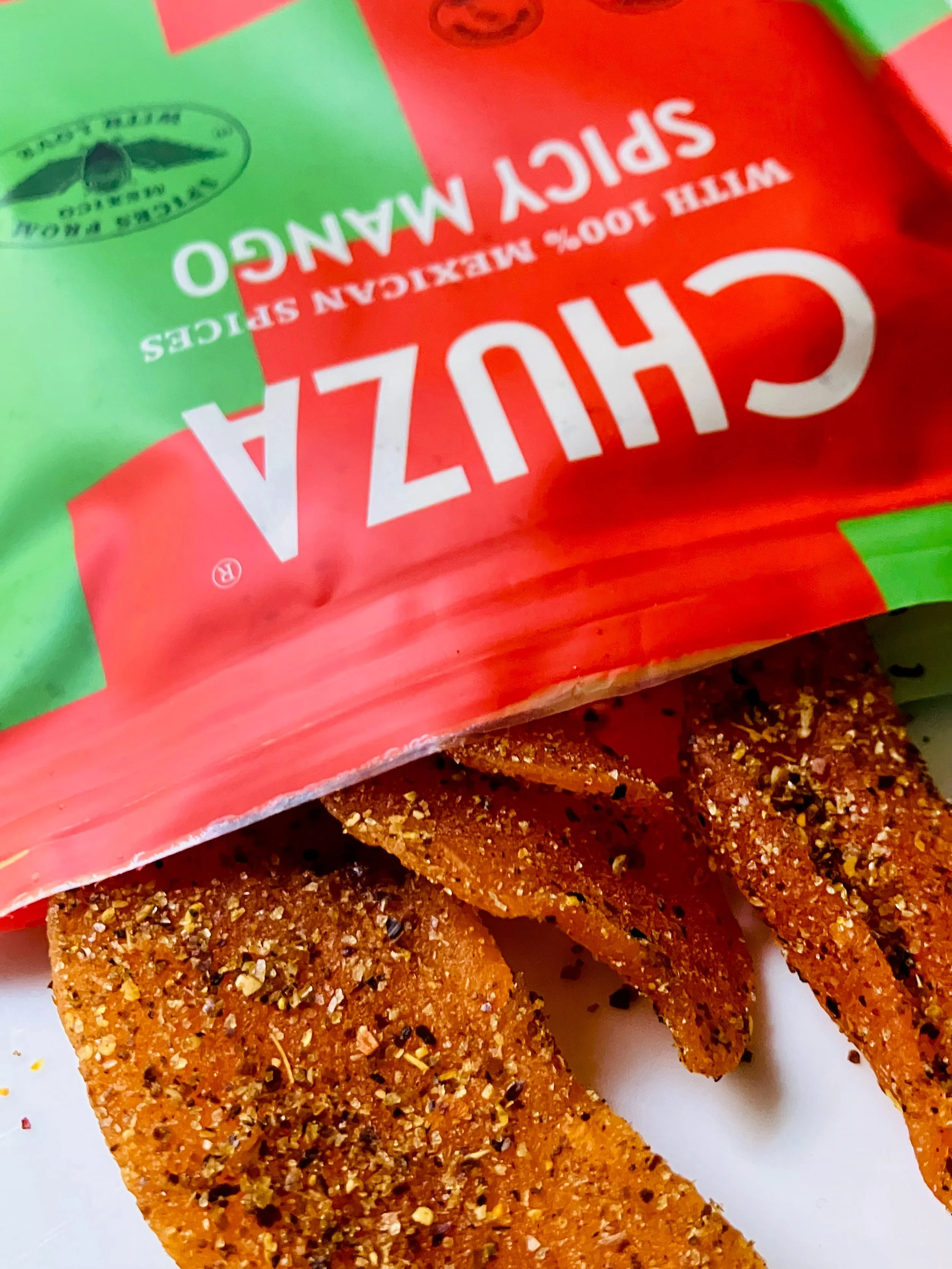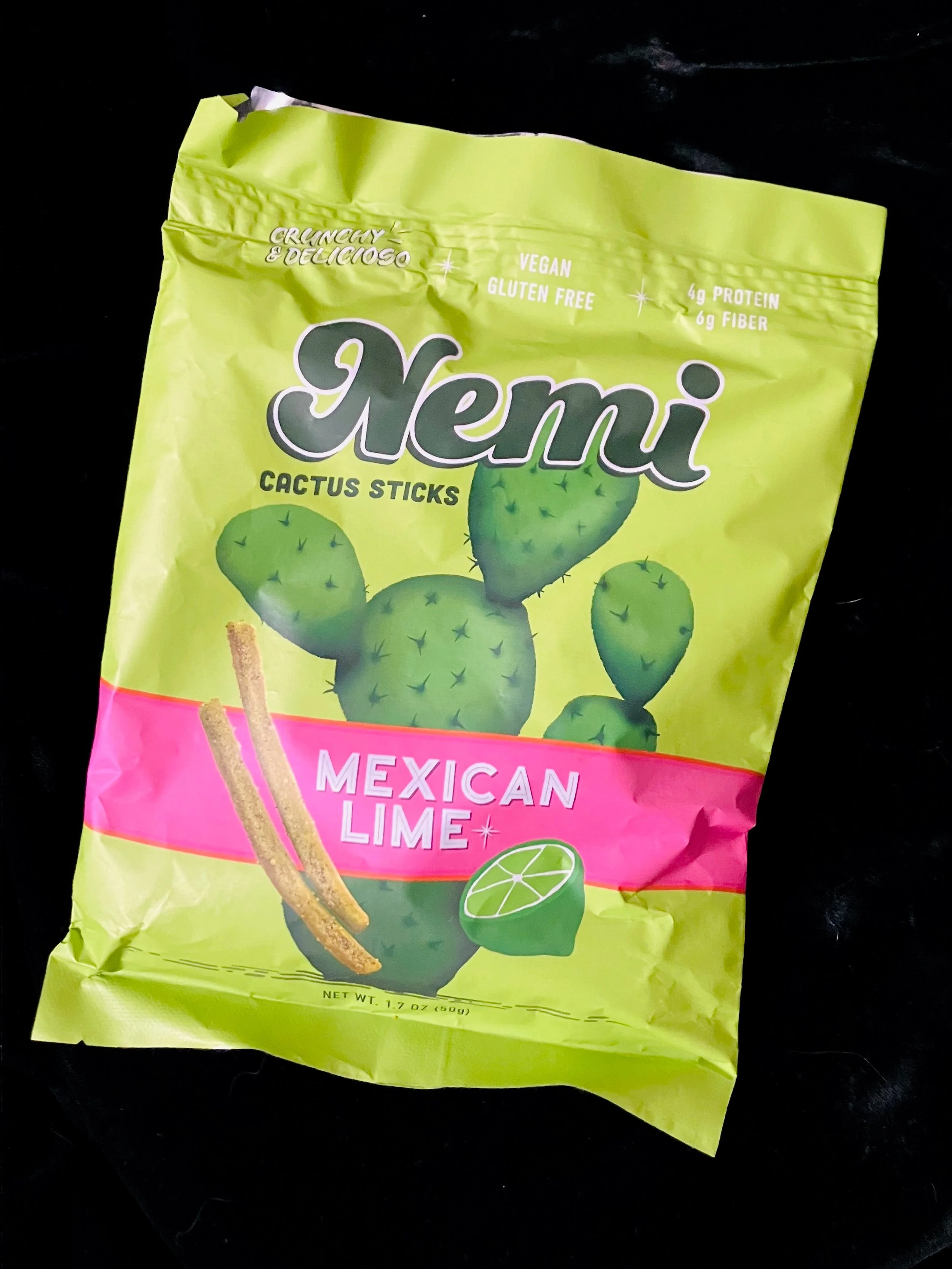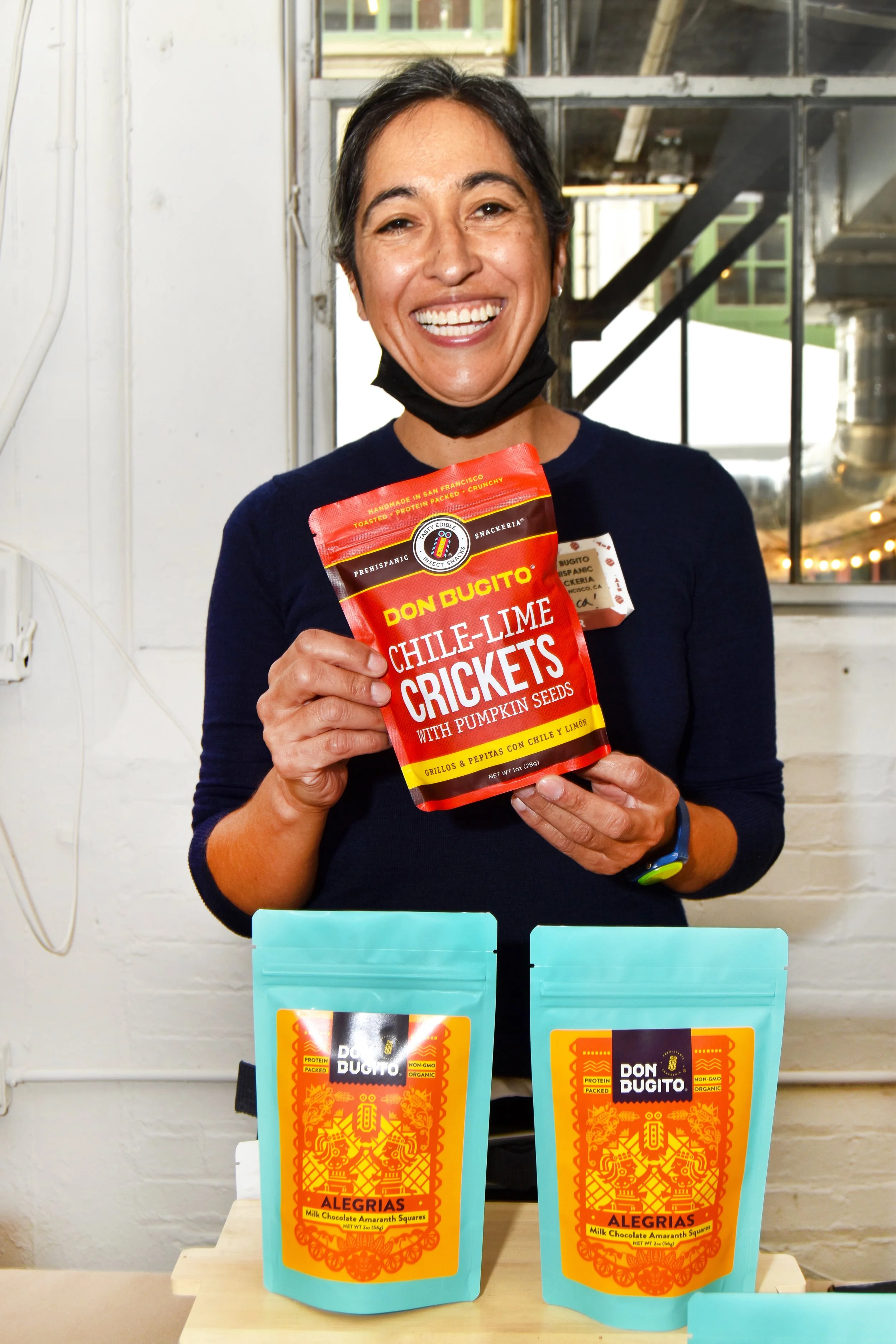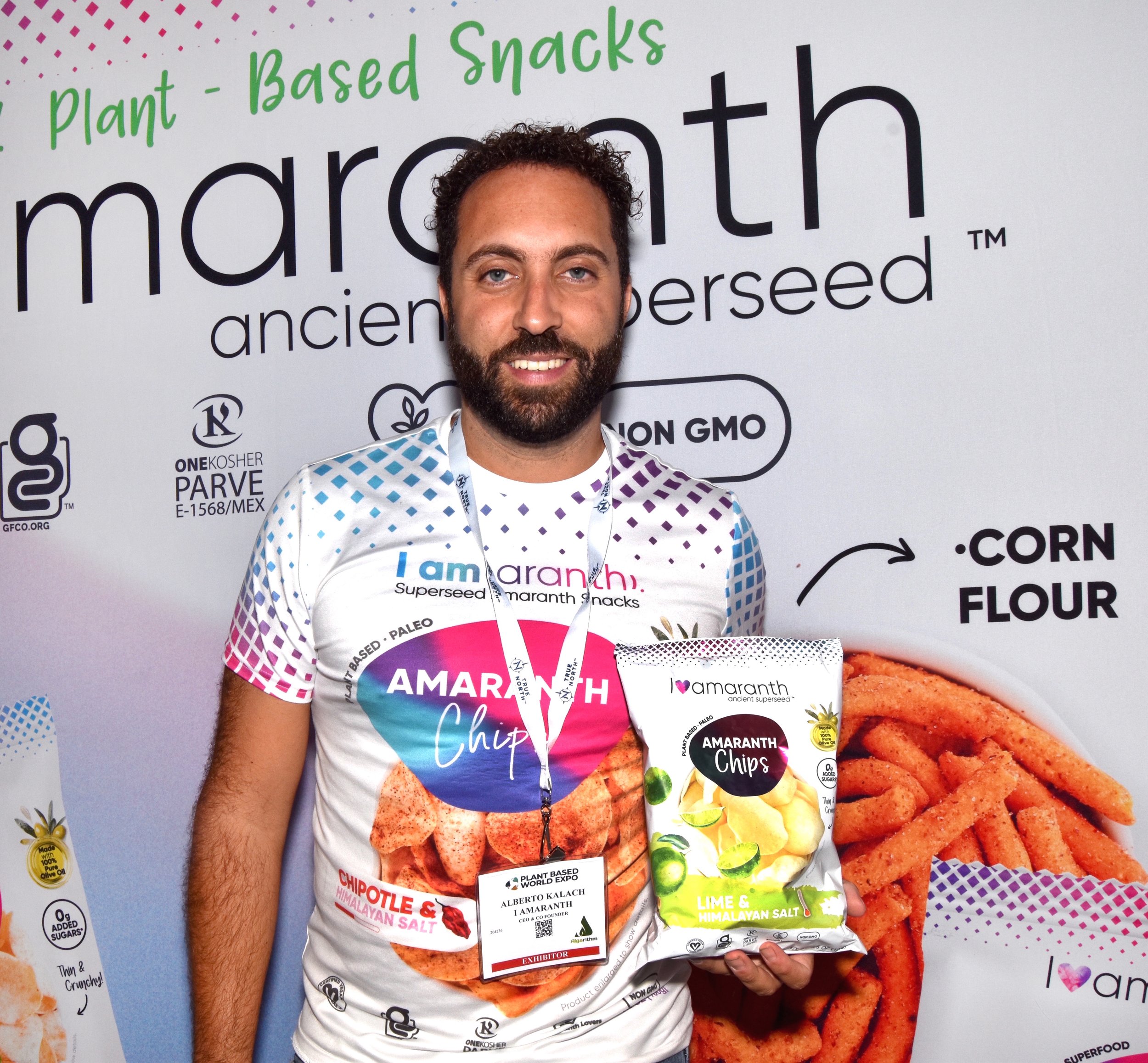Modern Mexican Food Brands Give Old El Paso The Boot
Chuza’s spicy mango, covered with Mexican spices. Photo: Nina Roberts
Published in the New Builders Dispatch on January 25, 2023
Authentic Mexican cuisine has become mainstream in the United States. Eateries, from street vendors to fine dining, serving tacos, chile rellenos or mole de pollos, now dot the country, especially concentrated in cities and southwestern states. Regional flavors from the country of 126 million people have become accessible to the mainstream eater, through food trucks and restaurants, many owned by Mexican immigrants.
Yet consumer packaged goods on supermarket shelves have been lagging so far behind. “Mexican”-style products like Old El Paso taco kits, owned by General Mills, are still sold at supermarkets across the country, a throwback circa 1985. B&G Foods brings Ortega sauces, like taco ranch, to the market, when there are thousands of better salsa options available across the country, and PepsiCo is still producing Rice-A-Roni’s Mexican style rice. Even Goya, the Latin American supermarket food stalwart owned by a Spanish-American family, seems corporate and outdated.
Nemi Cactus Sticks. Photo: Nina Roberts
The scene is starting to change. Regina Trillo is one of a growing number of Mexican food entrepreneurs creating a more contemporary product rooted in their motherland. She is the founder of Nemi Cactus Sticks, a crunchy stick snack made of nopal, the flat paddle part of a prickly pear cactus. Nemi sticks, which come in a handful of flavors like lime or chipotle, are made with amaranth seed flour, organic cactus powder, flax seed, among other ingredients.
‘Bare’ Supermarket Shelves
The inspiration for launching Nemi, which means “to live” in Nahuatl, came when Trillo first moved to Chicago from Mexico City and strolled down the supermarket aisles seeking foods and flavors from home. “None of what I saw was a representation of Mexican cultura,” recalls Trilllo, puzzled to see “bandidos” and sombreros on product labels. “I’m not only talking about the branding.” She read the ingredients, and found many were artificial. “The whole ecosystem provided me with a feeling of misrepresentation,” says Trillo.
While some supermarkets’ Mexican shelves still feature foods devoid of any semblance of actual Mexican
Other new Mexican brands selling in U.S. grocery stores include Somos, Tia Lupita, Vista Hermosa, Saucy Lips, Sabor Mexicano, Tenayo and La Fundidoria. On the sweet side, La Newyorkina sells paletas and ice cream pops.
Nearly all of the products are plant-based, and some are vegan. There area sprinkling of gluten- or grain-free options, often made with no preservatives or artificial coloring. Some snacks have reduced salt, or added no sugar, or only use non-GMO ingredients.
Nemi Cactus Sticks made with nopal.
Photo: Nina Roberts
Nemi launched in 2019 and is growing rapidly, , according to Trillo, though she would not give revenue figures. Nemi Cactus Sticks sell at all Juice Press locations, a handful of chains like Central Market in Texas and independent specialty shops.
“It’s pushing back against this stereotype that if something is ethnic, or Mexican, then it has to be cheap, low-quality ingredients, or artificial ingredients,” she says. The packaging features an illustrated prickly pear cactus, and the words playfully flow between English and Spanish. Of theestimated 10.7 million people born in Mexico living in the U.S., many are bilingual. “And yes,” says Trillo, “it is Mexican—without the sombrero.”
Standing Against Stereotypes
“I think there’s been this cultural movement coming from what some people may categorize as ‘ethnic food,’” says Trillo, also a human rights lawyer.
She points to Fly By Jing, founded by Jing Gao, as one of the pioneering brands to create a niche product—a Sichuan chili crisp—geared for the mainstream consumption without any stereotypical Chinese branding.
Packaging referencing modernist Mayan Pyramids, Danny Schwarz is the founder of Chuza, which produces dried fruits like mangos, strawberries, pineapple and nopal (technically a vegetable) covered in hot Mexican spices. Schwarz grew up in Monterrey, Mexico and eventually moved to the U.S., working in the tequila industry. When he was selling the tequila Gran Centenario, he developed a passion for sharing Mexican culture with the U.S. market.
Schwarz launched Chuza in 2021, replicating some of the snacks he grew up eating. Chuza products sell in bright, bold, colorful pouches with angular patterns. Schwarz wanted the package design to reference a metaphorical minimalist Mexican architect, who likes color, designing the Mayan pyramids today.
Based in San Diego, CA, Schwarz doesn’t make the distinction between selling to the Mexican or Latin American consumer in the U.S. versus the mainstream, pointing out that Mexicans, Latin Americans, so vast in numbers, are part of the mainstream market. “There is a misconception that Hispanos are not looking for quality, or appreciative of a good story behind the brand,” says Schwarz. Chuza sells in Whole Foods’ Southern Pacific region, as well as at Midwest and Texas supermarkets, small independent shops, and Amazon.
Some of the Mexican and Latin American diaspora do only shop at the “mercados,” supermarkets geared for the local Latin American community, he notes. But Chuza sells in some mercados as well, as the price is on par with other spicy fruits imported from Mexico. However most of the newer Mexican products are more expensive than Mexican imported brands and those made by US corporations.
According to Migration Policy Institute, Mexican immigrants account for the largest undocumented group in the U.S., which typically limits work options for most, save for those with DACA status. The number of highly educated Mexican immigrants is rising fast. Mexican immigrants with a bachelor’s degree or higher grew from 269,000 in 2000 to 678,000 in 2017.
Barriers at Supermarkets
The entrepreneurs behind the brands still encounter some resistance.
The founder of Don Bugito, Monica Martinez, originally from Mexico City, sounds exasperated by buyers at mainstream supermarkets. “One of the challenges that I have faced as a brand,” says Martinez, “is the stigma that Mexicans don’t buy in those stores. Which is a lie.”
The founder of Don Bugito Monica Martinez at the 2022 Good Food Show in Brooklyn, NY. Photo: Nina Roberts
Don Bugito is carried by some MOM’s Organic Markets, and has a well publicized partnership with the ice cream company Salt & Straw.
Perhaps some of the frustration Martinez feels towards buyers, is due to the type of food she’s selling: edible bugs. In parts of Mexico there are some people—Martinez guesses 20 to 30 percent of the population—who eat chapulines, grasshoppers.
Martinez launched Don Bugito in 2011, which mainly sells crickets bathed in chili-lime, among other flavors; toasted mealworms; and products like cricket protein powder. Despite the positive UN reportsabout edible insects helping with world hunger and the sustainable aspects of farming insects, crickets have been a tough sell for Martinez.
Martinez hadn’t had electricity for two weeks due to the California storms during our interview. Perhaps in a state of heightened sensitivity, she railed against San Francisco, a city she recently vacated. “You would think, ‘Oh, San Francisco is a trendy, innovate food place,’ but most buyers did not support my product.” And neither did Michael Pollan a journalist who writes about the intersection of food, science and culture, teaching at UC Berkeley. “You go to an insect farm, you see how mind blowing, how resourceful it is!” says Martinez, sighing that she might have to start pushing her cricket-free chocolate amaranth squares more. “I’m tired of trying to convince the world to eat bugs.”
Aramanth Products
I Amaranth is family-owned business based in San Diego, CA, selling chips and sticks made of amaranth seed, nopal, chickpeas, olive oil and a little corn, in both Mexico and the U.S. I Amaranth produces a healthier version of chips and churritos, a traditional Mexican stick-like snack, typically made with corn, vegetable oil and chemicals.
Alberto Kalach at the 2022 Plant Based World Expo in New York City. Photo: Nina Roberts
Hellen Kalach and Alberto Kalach launched I Amaranth in 2019, just before the pandemic. Aramanth was part of the Aztec diet, but faded after the Spanish arrived in the 1500s. It has been experiencing a revival of sorts. Ms Kalach, a nutritionist and health coach, notes that Amaranth is high in lycine, an essential amino acid. The company spent two years perfecting its products to taste great in addition to being healthy.
According to Mr Kalach, I Amaranth grew quickly in Mexico, gaining distribution via 1,000 locations within several months. Most Mexicans are at least familiar with amaranth, if not its health benefits. But adoption has been slower in the U.S.. The brand’s products currently sell in San Diego area markets like Sprouts.
Corporate Power
As an increasing number of better tasting and healthy Mexican-owned brands emerge in supermarkets, why are corporate-produced products like Old El Paso and Ortega still selling in supermarkets? Or ancient products like canned beef and pork tamales that look like they’ve been sitting on the shelf since the 1970s?
Phil Lempert, a supermarket consultant based in Los Angeles notes that the market is fragmented and that people who grew up eating corporatized Mexican food still play a big role. Those shopping for Mexican products include Mexican immigrants, kids of Mexicans, people of all ethnicities who like Mexican flavors, especially Gen Z and Millennials. “Then, you’ve got mainstream America who goes to Taco Bell,” says Lempert, “And that’s why the Ortega products are still on the shelves, because that’s the Taco Bell experience.”
Another contributing factor is a supermarket’s method of distribution. “Certain retailers, when it comes to ‘ethnic foods,’ whether it’s Chinese foods, Mexican foods, kosher foods, and so on, are still going through what’s called the rack jobber,” says Lempert. A “rack jobber” is an outside distributor who control a section of the supermarket shelves, instead of an inhouse category manager, typically more savvy and sophisticated about food trends.
“I think what they’re doing is brilliant,” says Lempert of the Mexican producers who are making healthier, innovative products inside packages with modern designs.
Financing An Immigrant Food Revolution
Most of these Mexican snack companies have been bootstrapping. Schwarz raised a friends and family round of capital and is looking to raise another round soon to scale his operations. He reports Chuza’s growth as 15 X from 2021 to 2022, but he wouldn’t reveal his revenues.
Could this be the beginning of supermarkets saying a final adios to corporate-owned brands with no soul, to make room for smaller, more intentional brands making healthier Mexican food? Solo el tiempo lo dirá.




